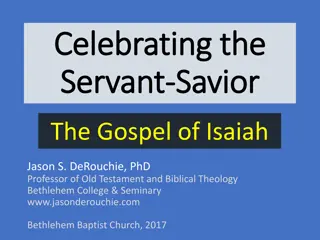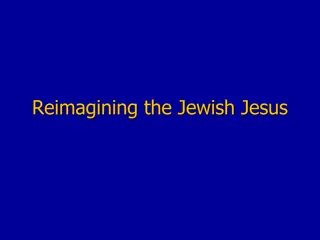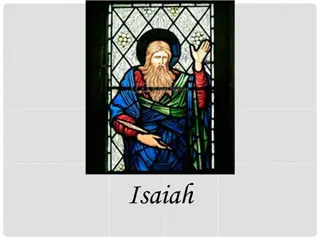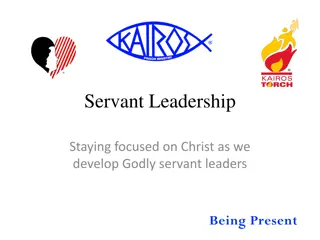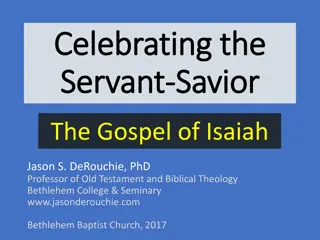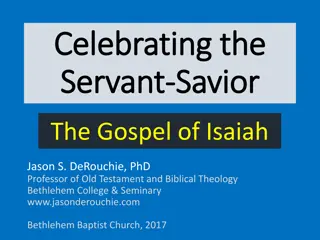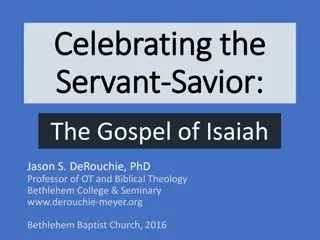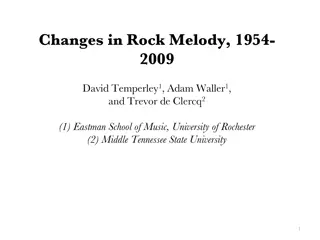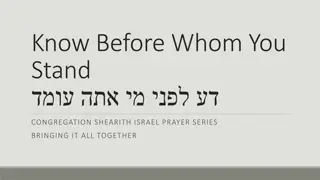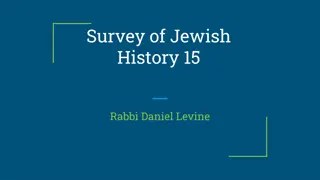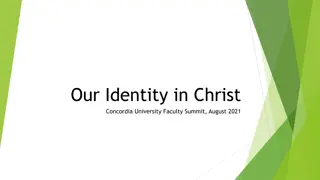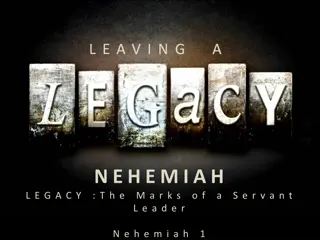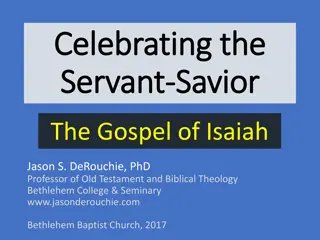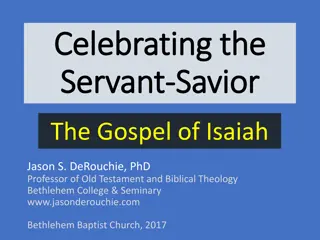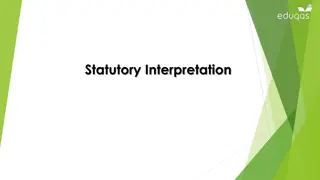Understanding the Servant Songs of Isaiah and Jewish Interpretation
The Servant Songs of Isaiah, particularly in chapters 42, 49, 50, and 52-53, are pivotal in understanding the prophetic messages related to the servant figure. Isaiah's divisions, historical context, and interpretations within Judaism, including views on the servant as Israel rather than the Messiah, offer profound insights into biblical narratives and beliefs. Explore the historical background, theological underpinnings, and differing perspectives regarding the servant in this comprehensive overview of Isaiah's prophecies.
Download Presentation

Please find below an Image/Link to download the presentation.
The content on the website is provided AS IS for your information and personal use only. It may not be sold, licensed, or shared on other websites without obtaining consent from the author. Download presentation by click this link. If you encounter any issues during the download, it is possible that the publisher has removed the file from their server.
E N D
Presentation Transcript
The 4 Servant Songs of Isaiah Phil 2:5-7 Let this mind be in you, which was also in Messiah Yeshua: Who, being in the form of Elohim, thought it not robbery to be equal with Elohim: But made himself of no reputation, and took upon him the form of a servant, and was made in the likeness of men:
Who was Isaiah? Isaiah prophesied during reigns of Kings Uzziah, Jotham,Ahaz and Hezekiah, and probably lived from about 740-580BCE. Isaiah, HEB: Yeshyahu (Yah is salvation) Isaiah had two sons: She ar-Ya shuv A remnant shall return , Maher-Shalal-Hash-Baz Spoil quickly, plunder speedily . According to the Rabbinic literature, Isaiah was a descendant of the royal house of Judah and Tamar (Sotah 10b). He was the son of Amoz (not to be confused with Prophet Amos), who was the brother of King Amaziah of Judah. (Talmud tractate Megillah 15a) [https://en.wikipedia.org/wiki/Isaiah]
The 4 servant songs #1 Isaiah 42:1-4 (7) #2 Isaiah 49:1-6 #3 Isaiah 50:4-9 #4 Isaiah 52:13-53:12 Berhard Duhm coined the term servant songs in his German commentary on Isaiah published in 1892. (Das Buch Jesaja [Isaiah]) Bernhard Lauardus Duhm (October 10, 1847 November 1, 1928) was a German Lutheran theologian https://en.wikipedia.org/wiki/Bernhard_Duhm
Isaiah divided into 3 sections Section #1 Prophecies of condemnation Isaiah CH 1 - 35 Section #2 Historical content Isaiah CH 36 - 39 Section #3 Prophecies of consolation/comfort Isaiah CH 40 - 66 All four servant songs/ prophecies within section #3 Berhard Duhm also coined the words: Proto-Isaiah (1-39) words of Isaiah , Deutero- Isaiah (40-55) work of an anonymous author in exile , Trito-Isaiah (56-66) written after the returned exiles. Isaiah s book can be broken into two messages: Ch 1-33 deals with judgment and restoration for Jerusalem, Judah, and the nations and Ch 34-66 deals with the future restoration.
Judaism Interpretation In the 4 servant songs, the interpretation from Judaism is that the servant within the passages is referring to the nation of Israel and not Mashiach . Did this come about from the Talmud? Several references in the Talmud are anti-Yeshua : (from wiki.) Babylonian Berakoth 17b "that we will not have a son or disciple ... like Jesus the Nazarene" (Editions or MS: Oxford 23) Babylonian Sanhedrin 103a "that you will not have a son or disciple ... like Jesus the Nazarene" (Editions or MSs: Firenze II.1.8 9, Barco, Munich 95) Babylonian Sotah 47a "The master said: Jesus the Nazarene because he practiced magic" (Editions or MS: Munich 95) Babylonian Sanhedrin 107b "The master said: Jesus the Nazarene practiced magic (Editions or MSs: Firenze II.1.8 9, Barco ) As a frivolous disciple who practiced magic and turned to idolatry (Sanh 107b; Sot 47a), and Jesus as a sorcerer with disciples (b Sanh 43a-b) Isn t it odd, that Judah is looking for Mashiach but most refuse to talk about these servant songs, especially Isaiah 53?
Judaism Interpretation Within the Tanakh there are seemingly contradictions the Messiah. Is he the suffering servant (Mashiach ben Yosef) or conquering King (Mashiach ben David)? This contradiction caused the sages of old to believe that there will be two Messiahs who will appear one who suffers for the people, and one who will conquer and reign over them. R. Alexandri said that R. Joshua bar Levi combined the two paradoxical passages; the one that says, Behold, one like the Son of Man came with the clouds of heaven (Dan 7:13) [Mashiach ben David] and the other verse that says, poor and riding upon a donkey (Zech. 9:9) [Mashiach ben Yosef]. He explained it in this manner: If they [Israel] are worthy, He will come with the clouds of heaven; if they are unworthy He will come poor and riding upon a donkey. Talmud- Sanhedrin 98a
Judaism Interpretation The sages of old understood that there would be a suffering servant messiah . Rabbi El-Sheikh understood that not only Isa 53 but also Zec 12 prophesied that it is the Messiah who will suffer and die for our iniquities. The Ramban (Zohar II, 1) interprets Isa 53 as follows: Because the stripes by which he [the messiah, not the nation of Israel] is vexed and distressed will heal us; God will pardon us for his righteousness, and we shall be healed both from our own transgressions and from the iniquities of our fathers. [emphasis mine] Rashi, interpreting Zech 12:10, writes in Sukkah 52:71 the following: The land shall mourn, is found in the prophecy of Zechariah, and he prophesies of the future, that they shall mourn on account of Messiah, the son of Joseph, who shall be slain The Rabbis of today claim that Messiah was never to suffer or die, but to be King who would come and conquer and save Israel.
Isaiah 42:1-4(7) Isa 42:1-7 Behold my servant, whom I uphold; mine elect, in whom my soul delighteth; I have put my spirit upon him: he shall bring forth judgment to the Gentiles. He shall not cry, nor lift up, nor cause his voice to be heard in the street. A bruised reed shall he not break, and the smoking flax shall he not quench: he shall bring forth judgment unto truth. He shall not fail nor be discouraged, till he have set judgment in the earth: and the isles shall wait for his law. Thus saith God the LORD, he that created the heavens, and stretched them out; he that spread forth the earth, and that which cometh out of it; he that giveth breath unto the people upon it, and spirit to them that walk therein: I the LORD have called thee in righteousness, and will hold thine hand, and will keep thee, and give thee for a covenant of the people, for a light of the Gentiles; To open the blind eyes, to bring out the prisoners from the prison, and them that sit in darkness out of the prison house.
Isaiah 42:1-7 [Hezekiah] Some Rabbi s believe that these verses were in regards to King Hezekiah. Isa 42:1 Behold my servant Hezekiah: called God s servant [2 Ch 32:16] Isa 42:2 He shall not cry, nor lift up Hezekiah s command to remain silent though faced against the defeat by a mighty power (Assyria) [Isa 36:21] Isa 42:1,4,7 judgment to the nations regions/territories shall wait for his law for a light of the nations The nations see the defeat of mighty Assyria and wonder [2 Ch 32:23] Isa 42:6 ...hold your hand . Hezekiah s name means God made him strong Isa 42:7 bring out the prisoners from prison The Nation liberated [Isa 37:21-38] Hezekiah initiated a spiritual revival in the land, he led the people to keep the Passover, he was scorned and attacked by the Assyrians (he probably was scorned and questioned by many of his own people), and he was cut off in the prime of his life (near death experience), but then figuratively revived from near death and lived [this part found in Isa 38].
Isaiah 42:1-7 [Hezekiah] Some Rabbi s believe that these verses were in regards to King Hezekiah. The idea that Hezekiah was the Messiah probably prevailed from after the time of King Ahaz (after Hezekiah was born and then ascended to Kingship) until as late as the 1st century CE when Rabbi Hillel stated the following: Israel cannot expect Messiah any longer for they already enjoyed him in the time of King Hezekiah. [Sanhedrin 99a] However, many- if not all- of Hillel s colleagues disagreed with him concerning that statement. Some Talmud scholars believed that Hezekiah could have been the Messiah: Of the increase of his government and peace there shall be no end (Isa 9:7). One may ask why in the Hebrew in the first word lemarbe the letter mem, though in the middle of the word, is written as a final mem? The answer is that the Holy One, blessed be He, considered the possibility of making Hezekiah Messiah [Sanhedrin 94a] Even this Talmudic passage goes on to imply that Hezekiah was not Messiah
Isaiah 42:1-7 [Hezekiah] Some Rabbi s believe that these verses were in regards to King Hezekiah. Rashi also concluded that the prophecy of Isa 9:6-7 could not refer to Hezekiah, because if you count up the years of Hezekiah you will find that Hezekiah was born nine years before his father [Ahaz] ascended the throne. Hence, Hezekiah was born nine years before the prophecy was given and yet the prophet (Isaiah) says: Behold, the virgin shall (future tense) conceive (on the other hand- Rashi believes all 4 S.S. to be Israel) Keep in mind that Rashi also believed that Messiah would appear in 1352 CE or 1478 CE. If Hezekiah WAS the Messiah, then why were prophets, like Zechariah (3:8, 9:9, 6:12-13, 10:4) Haggai (2:6-10), and Malachi (3:1, 4:5), who prophesied well after Hezekiah s reign about the coming of Messiah? Even though Hezekiah was Messiah-like, he did not fulfill the requirements of THE Mashiach and hence, cannot be the Messiah.
Isaiah 42:1-4(7) This is the first of the four servant songs, fulfilled in Messiah Yeshua (ch 49:1-13; 50:4-9; 52:13-53:12). Isaiah sprinkles references to the servant of the Lord throughout ch 40-55. Often it is a title for the people as a whole (41:8-9; 42:19;43:10; 44:1-2,21,26; 45:4; 48:20), but at times the servant is a specific person within Israel who is distinct from the whole; with a calling to serve Israel and beyond (49:5-6; 50:10; 52:13,53:11). 42:1 Behold my servant. In contrast to the idols and the idol worshiping nations, God presents his servant as the only hope of the nations (Matt 12:18-21). whom I uphold. The servant s success is of God. in whom my soul delights. The servant is God s delight, in contrast with the abomination of Isa 41:24 justice. The key word in 42:1-4 The messianic servant is the only hope for a truly just world. This Messiah will bring not only individual spiritual forgiveness and health (Isa 1:18) but also the establishment of perfect justice throughout all earthly governments. 42:6-7 The servant is a covenant for the people (Isa 49:8), i.e., he represents the people in God s covenant. He will become a light for the nations (Isa 49:6), bringing the knowledge of God to them; this is probably lies behind Jesus saying in John 8:12. to open the eyes to bring out. This is the purpose of God s grace for his people, using liberation from Babylonian exile as an image for spiritual liberation. ESV Study Bible (commentary), pg 1315.
Isaiah 49:1-6 Isa 49:1-6 Listen, O isles, unto me; and hearken, ye people, from far; The LORD hath called me from the womb; from the bowels of my mother hath he made mention of my name. And he hath made my mouth like a sharp sword; in the shadow of his hand hath he hid me, and made me a polished shaft; in his quiver hath he hid me; And said unto me, Thou art my servant, O Israel, in whom I will be glorified. Then I said, I have laboured in vain, I have spent my strength for nought, and in vain: yet surely my judgment is with the LORD, and my work with my God. And now, saith the LORD that formed me from the womb to be his servant, to bring Jacob again to him, Though Israel be not gathered, yet shall I be glorious in the eyes of the LORD, and my God shall be my strength. And he said, It is a light thing that thou shouldest be my servant to raise up the tribes of Jacob, and to restore the preserved of Israel: I will also give thee for a light to the Gentiles, that thou mayest be my salvation unto the end of the earth.
Isaiah 49:1-6 The second servant song clarifies that the servant is distinct from Israel, also calls him Israel (49:3); this is best explained as identifying the servant as the representative and embodiment of the whole people. This last point shows why the traditional Christian reading, that the servant is a messianic figure, accurately captures Isaiah s intent. First, in the Davidic covenant, David s heirs represent and embody the people as a whole: Israel is God s son (Ex 4:22-23), and the king becomes God s son on his coronation (2 Sam 7:14; Ps 89 26-27). Therefore the servant follows the pattern of David s heirs. Second, the servant achieves the expansion of his rule throughout the gentile world (Isa 42:1-4; 52:13-15), which is the work of the Davidic Messiah in chs. 7-12. Third, later prophets describe as heir of David; and especially the Messiah, as the servant (Eze 34:23-24; 37:25; Hag 2:23; Zech 3:8; Jer 33:21-22, 26), which supports reading the servant in Isaiah as a messianic figure. In addition to his royal function, the servant also has a prophetic role (Isa 49:1; 50:4, 10) and a priestly one (53:11; Psa 110:4, which folds a priestly role into Messiah s royal office). Isaiah s audience must know that God will restore the exiles and then fulfill the mission of Israel by means of the servant whom he will raise up at some unspecified time after the return from exile: this is where their story is headed. ESV Study Bible (commentary), pg 1315. Act 1:6-7 When they therefore were come together, they asked of him, saying, Master, wilt thou at this time restore again the kingdom to Israel? And he said unto them, It is not for you to know the times or the seasons, which the Father hath put in his own power.
Isaiah 49:1-6 The servant of the Lord will restore Israel and save the nations. This is the second of four Servant Songs, describing the Messiah. 49:3 my servant, Israel. . Comparing vv. 5-6, this servant Israel restores the nation Israel. The servant is the true embodiment of what the nation failed to be, namely, the one in whom I will be glorified. [Yeshua, who is an Israelite, is a son of Israel. Deu 18:15] 49:4 The servant confesses his sense of failure due to Israel s (the nation of) poor response YET, The servant does not turn from God in cynical unbelief; he accepts emotional suffering and frustrating toil with confidence that God will reward him. 49:5-6 It is too light a thing. It is too small a task to redeem only the tribes of Jacob (Israel). It is clear here that the servant, though he embodies Israel (v.3), is nevertheless distinct from Israel, and has a calling to serve Israel and beyond. Far from failing, the servant is declared by God to be the only hope of the world. [A light for the nations.] [ that my salvation may reach to the end of the earth.] A clear statement of salvation s worldwide scope, a theme that Acts develops by quoting the text (Acts 1:8; 13:47) ESV Study Bible (commentary), pg 1330.
Isaiah 50:4-9 Isa 50:4-9 The Lord GOD hath given me the tongue of the learned, that I should know how to speak a word in season to him that is weary: he wakeneth morning by morning, he wakeneth mine ear to hear as the learned. The Lord GOD hath opened mine ear, and I was not rebellious, neither turned away back. I gave my back to the smiters, and my cheeks to them that plucked off the hair: I hid not my face from shame and spitting. For the Lord GOD will help me; therefore shall I not be confounded: therefore have I set my face like a flint, and I know that I shall not be ashamed. He is near that justifieth me; who will contend with me? let us stand together: who is mine adversary? let him come near to me. Behold, the Lord GOD will help me; who is he that shall condemn me? lo, they all shall wax old as a garment; the moth shall eat them up.
Isaiah 50:4-9 The servant of the Lord suffers in order to sustain others. This is the third of four Servant Songs, which anticipate the Messiah. This song focuses on the servant as a rejected prophet. 50:4 The servant is a scholar, well schooled in the Word of God. Unlike the guilty silence of God s people (v.2), the servant is responsive to God s Word (48:8). 50:6 those who strike. The gentle healer (42:3), patient worker (49:4), and wise comforter (50:4) is greeted with abusive opposition, and he accepts it. The description of the servant s rejection intensifies as the Servant Songs progress (49:7; 50:6; 52:14- 53:9). 50:7 my face like flint. The servant chose his sufferings willingly and he moves forward with resolute determination, confident in God s overruling help. 50:8-9 As 53:4-6 will make clear, the servant did not suffer because he was guilty but because others were guilty. For his innocence, God vindicated him (1 Tim 3:16). ESV Study Bible (commentary), pg 1333.
Isaiah 52:13-53:12 Isa 52:13-53:12 Behold, my servant shall deal prudently, he shall be exalted and extolled, and be very high. As many were astonished at thee; his visage was so marred more than any man, and his form more than the sons of men: So shall he sprinkle many nations; the kings shall shut their mouths at him: for that which had not been told them shall they see; and that which they had not heard shall they consider. Who hath believed our report? and to whom is the arm of the LORD revealed? For he shall grow up before him as a tender plant, and as a root out of a dry ground: he hath no form nor comeliness; and when we shall see him, there is no beauty that we should desire him. He is despised and rejected of men; a man of sorrows, and acquainted with grief: and we hid as it were our faces from him; he was despised, and we esteemed him not. Surely he hath borne our griefs, and carried our sorrows: yet we did esteem him stricken, smitten of God, and afflicted. But he was wounded for our transgressions, he was bruised for our iniquities: the chastisement of our peace was upon him; and with his stripes we are healed. All we like sheep have gone astray; we have turned every one to his own way; and the LORD hath laid on him the iniquity of us all. He was oppressed, and he was afflicted, yet he opened not his mouth: he is brought as a lamb to the slaughter, and as a sheep before her shearers is dumb, so he openeth not his mouth. He was taken from prison and from judgment: and who shall declare his generation? for he was cut off out of the land of the living: for the transgression of my people was he stricken. And he made his grave with the wicked, and with the rich in his death; because he had done no violence, neither was any deceit in his mouth. Yet it pleased the LORD to bruise him; he hath put him to grief: when thou shalt make his soul an offering for sin, he shall see his seed, he shall prolong his days, and the pleasure of the LORD shall prosper in his hand. He shall see of the travail of his soul, and shall be satisfied: by his knowledge shall my righteous servant justify many; for he shall bear their iniquities. Therefore will I divide him a portion with the great, and he shall divide the spoil with the strong; because he hath poured out his soul unto death: and he was numbered with the transgressors; and he bare the sin of many, and made intercession for the transgressors.
Suffering Servant- Israel? Rashi believes in all 4 servant songs that the servant is the nation of Israel. Ibn Ezra believes that the suffering servant passage refers to Isaiah himself. Modern Rabbinic interpretation of the Isaiah 53 verses is that the suffering servant is Israel, not Messiah. However, within the writings some earlier Rabbi s will show that the suffering servant is NOT Israel but a Messiah-type figure. Rabbi Moshe Alshekh, a famous 16th century rabbinic scholar who lived in Tsefat, Israel commented: [Our] Rabbis with one voice, accept and affirm the opinion that the prophet is speaking of king Messiah. The Aramaic translation of this chapter, ascribed to Rabbi Jonathan ben Uzziel, a disciple of Hillel who lived early in the second century C.E., says the following: (Targum Jonathan on Isa 53) Behold my servant Messiah shall prosper; he shall be high, and increase, and be exceeding strong: as the house of Israel looked to him through many days, because their countenance was darkened among the peoples, and their complexion beyond the sons of men.
Suffering Servant- Israel? In the Babylonian Talmud, Sanhedrin 98b says: The Messiah what is his name? The Rabbis say, the leprous one; those of the house of Rabbi say, the sick one, as it is said, Surely he hath borne our sicknesses. [Isa 53:5] Also in the Midrash Rabbah, is an explanation of Ruth 2:14: He is speaking of the King Messiah: Come hither draw near to the throne and dip thy morsel in the vinegar, this refers to the chastisements, as it is said, But he was wounded for our transgressions, bruised for our iniquities. [Isa 53:5] Herz Homberg (1749-1841), one of the great Jewish educators comments by saying: According to the opinion of Rashi and Ibn Ezra, it relates to Israel at the end of their captivity. But if so, what can be the meaning of the passage, He was wounded for our transgressions ? Who was wounded? Who are the transgressors? Who carried out the sickness and bare the pain? The fact is that it refers to the King Messiah. Two other important points to consider: #1) the text is in the singular, and #2) Isa 53:8, were the Israelite people ever cut off out of the land of the living? No (Jer 31:35-37 says that God promised Israel will exist forever.)
Isaiah 52:13-53:12 ESV Commentary, pg 1337. The Lord s Servant: The Exalted Sin-Bearer. Isaiah finally explains how the Holy One can bless sinful people: all the promises of God will come true for them because the suffering and triumphant servant removes their guilt before God by his sacrifice. To be clear on which parties are described, it helps to observe the pronouns: I in this passage is typically the Lord, he the servant, and we the servant s disciples, who themselves need the servant to bear their guilt (53:4-6), which is why the servant cannot be Israel or the pious within Israel. ESV Study Bible (commentary), pg 1337. Isa 53:1 The arm of YHWH is the zeroah , a metaphor for the Messiah (see my teaching on The Arm of the LORD . Isa 53:6 All we every one. The servant, who alone was sinless, was uniquely qualified to bear the sins of others, and all people contributed to his pain. The Lord has laid on him the iniquity of us all (Lev 16:21-22; 2 Cor 5:21; 1 Pet 2:25) ESV Study Bible (commentary), pg 1338.
What Did They Think? Even though modern day Judaism (and even back to the age of the Talmudic writings) credit the servant to Israel or even to Isaiah himself, let s see what the disciples thought of these passages. It is my opinion that the servant songs of Isaiah would have been in the Haftarah cycle during and before 1st Century CE and midrashed extensively in the Synagogues. Can we find anything concerning Yeshua being that servant from the Isaiah passages? ..Brit Chadasha
Isaiah 42:1-4(7) After Yeshua healed a man s withered hand on the Sabbath: Matthew writes: Mat 12:16-21 And (Yeshua) charged them that they should not make him known: That it might be fulfilled which was spoken by Esaias the prophet, saying, Behold my servant, whom I have chosen; my beloved, in whom my soul is well pleased: I will put my spirit upon him, and he shall shew judgment to the Gentiles. He shall not strive, nor cry; neither shall any man hear his voice in the streets. A bruised reed shall he not break, and smoking flax shall he not quench, till he send forth judgment unto victory. And in his name shall the Gentiles trust. (emphasis mine)
Isaiah 49:1-6 Luk 2:28-32 Then took he (Yeshua) him up in his (Simeon) arms, and blessed Elohim, and said, My Sovereign, now let thou thy servant depart in peace, according to thy word: For mine eyes have seen thy salvation (Yeshua), Which thou hast prepared before the face of all people; A light to lighten the Gentiles[v6], and the majesty of thy people Israel. Act 1:8 But ye shall receive power, after that the Holy Spirit is come upon you: and ye shall be witnesses unto me both in Jerusalem, and in all Judaea, and in Samaria, and unto the uttermost part of the earth. Act 13:47 For so hath the Lord commanded us, saying, I have set thee to be a light of the Gentiles, that thou shouldest be for salvation unto the ends of the earth.
Isaiah 50:4-9 Yeshua s words (tongue) guided only by Elohim[v4]: Joh 7:16-17 Yeshua answered them, and said, My doctrine is not mine, but his that sent me. If any man will do his will, he shall know of the doctrine, whether it be of Elohim, or whether I speak of myself. Joh 12:49-50 For I have not spoken of myself; but the Father which sent me, he gave me a commandment, what I should say, and what I should speak. And I know that his commandment is life everlasting: whatsoever I speak therefore, even as the Father said unto me, so I speak. Yeshua endured physical trials and affliction[v6] Mat 26:67, Mar 14:65 Then did they spit in his face, and buffeted him; and others smote himwith the palms of their hands Yeshua steadfastly set his face (like flint) to go to Jerusalem[v7] Luk 9:51 And it came to pass, when the time was come that he should be received up, he steadfastly set his face [set his face like flint] to go to Jerusalem
Isaiah 52:13-53:12 Isaiah 52:15 = Romans 15:21 Rom 15:21 But as it is written, To whom he was not spoken of, they shall see: and they that have not heard shall understand. Isaiah 53:1 = John 12:38, Romans 10:16 Joh 12:38 That the saying of Esaias the prophet might be fulfilled, which he spake, Lord, who hath believed our report? and to whom hath the arm of the Lord been revealed? Rom 10:16 But they have not all obeyed the gospel. For Esaias saith, Lord, who hath believed our report? Isaiah 53:4-(5) = Matthew 8:17, 1 Pet 2:24 Mat 8:17 That it might be fulfilled which was spoken by Esaias the prophet, saying, Himself took our infirmities, and bare our sicknesses. 1Pe 2:24 Who his own self bare our sins in his own body on the tree, that we, being dead to sins, should live unto righteousness: by whose stripes ye were healed.
Isaiah 52:13-53:12 Isaiah 53:7-8 = Acts 8:32-33 (Philip and the Eunuch) Act 8:32 The place of the scripture which he read was this, He was led as a sheep to the slaughter; and like a lamb dumb before his shearer, so opened he not his mouth: Act 8:33 In his humiliation his judgment was taken away: and who shall declare his generation? for his life is taken from the earth. Isaiah 53:9 = 1 Pet 2:22 1Pe 2:22 Who (Messiah) did no sin, neither was guile found in his mouth: Isaiah 53:12 = Mark 15:28, Luke 22:37 Mar 15:28 And the scripture was fulfilled, which saith, And he was numbered with the transgressors. Luk 22:37 For I say to you, that this which is written must be fulfilled in me, He will be numbered among the wicked; for all the things concerning me will be fulfilled. Isaiah 53:4-6, 12 Borne our griefs and carried our sorrows- he was wounded for our transgressions bruised for our iniquities. Lord laid on him the iniquity of us all. Mat 20:28 The son of man came to give his life a ransom for many
Messiah- a 2nd Moses figure The following taken from: The Lord s Anointed. Interpretation of Old Testament Messianic Texts (Baker, 1995) 105-140] The Servant of the Lord in the Servant Songs of Isaiah: a Second Moses Figure1 G.P. Hugenberger In conclusion this study has argued for an identification of the servant with the expected prophet like Moses mentioned in Deuteronomy 18:14ff. and 34:10ff. Although the second Moses hypothesis proves its heuristic value in resolving significant exegetical problems in the servant songs, it does not purport to offer an exhaustive explanation for every detail.(96) It is the contention of this paper, however, that only by recognizing the servant as predominantly a second Moses figure can justice be done both to the integrity of the servant songs with their context, which is dominated by second exodus imagery, and to the otherwise perplexing combination of corporate and individual, as well as prophetic, royal, and priestly traits in the portrait of the servant. In short, precisely because he is the long awaited prophet like Moses, there is a substantial degree of truth in most previous studies on the identity of the servant... http://www.parkstreet.org/sites/default/files/papers/christintheot.pdf
Servant Songs: Pointing to A Prophet Like Moses Exo 14:31 And Israel saw that great work which the LORD did upon the Egyptians: and the people feared the LORD, and believed the LORD, and his servant Moses. In Yeshua s day, Israel was expecting The Prophet like Moses to deliver them Num 11:11 And Moses said unto the LORD, Wherefore hast thou afflicted thy servant? and wherefore have I not found favour in thy sight, that thou layest the burden of all this people upon me? Num 12:6-8 And he said, Hear now my words: If there be a prophet among you, I the LORD will make myself known unto him in a vision, and will speak unto him in a dream. My servant Moses is not so, who is faithful in all mine house. With him will I speak mouth to mouth, even apparently, and not in dark speeches; and the similitude of the LORD shall he behold: wherefore then were ye not afraid to speak against my servant Moses? Deu 34:5 So Moses the servant of the LORD died there in the land of Moab, according to the word of the LORD.
Servant Songs: Pointing to A Prophet Like Moses Num 12:3 (Now the man Moses was very meek (H6035), above all the men which were upon the face of the earth.) H6035 / a na v / a na yv BDB Definition: 1) poor, humble, afflicted, meek AHLB: 1359 (H6035) ac: Watch co: Eye ab: Affliction: The pictograph (ayin) is a picture of the eye, the nun is a picture of a seed representing continuance. Combined these mean "eye of continuance". The nomadic agriculturist carefully watches over his livestock and crops by keeping a close eye on them. It was common to construct a shelter consisting of a roof on four posts, as a shelter from the glare of the sun. (eng: eye - with the removal of the n) Mat 11:29 Take my yoke upon you, and learn of me; for I am meek and lowly in heart: and ye shall find rest unto your souls.
Servant Songs: A Prophet Like Moses Deu 18:15,18-19 The LORD your God will raise up to you a prophet like me from the midst of you, of your brethren; to him you shall hearken. Deu 18:18 I will raise up for them a prophet like you from among their brethren, and will put my words in his mouth; and he shall speak to them all that I shall command him. Deu 18:19 Whosoever will not hearken to my words which he shall speak in my name, I will require it of him. Deu 34:10-12 And there arose not a prophet since in Israel like Moses, whom the LORD knew face to face, Deu 34:11 In all the signs and the wonders, which the LORD sent him to do in the land of Egypt to Pharaoh and to all his servants and to all his land, Deu 34:12 And in all that mighty power, and in all the great signs which Moses wrought in the sight of all Israel.
Israel awaiting for the Prophet like Moses Joh 1:19-27 And this is the record of John, when the Jews sent priests and Levites from Jerusalem to ask him, Who art thou? And he confessed, and denied not; but confessed, I am not the Messiah. And they asked him, What then? Art thou Elias? And he saith, I am not. Art thou that prophet? And he answered, No. Then said they unto him, Who art thou? that we may give an answer to them that sent us. What sayest thou of thyself? He said, I am the voice of one crying in the wilderness, Make straight the way of the Lord, as said the prophet Elijah. And they which were sent were of the Pharisees. And they asked him, and said unto him, Why baptizest thou then, if thou be not that Messiah, nor Elijah, neither that prophet? John answered them, saying, I baptize with water: but there standeth one among you (of ISRAEL), whom ye know not; He it is, who coming after me is preferred before me, whose sandal I am not worthy to unloose.
The Songs in a nutshell The four Servant Songs describe the service, suffering, and exaltation of the Servant of YHWH, Yeshua the Messiah. All four songs show the Messiah to be Elohim s meek and gentle Servant. He is a royal figure, representing Israel in its ideal form; He is the High Priest, atoning for the sins of the people. Isaiah predicts that this Servant of YHWH would deliver the world from the prison of sin. In the royal terminology of the ANE, a servant was a trusted envoy , a confidential representative , or one who is chosen. Isaiah initially identifies Elohim s servant as Israel (Isa 41:8, 44:1-2). Israel serves as Elohim s witness (Isa 43:10), however, Israel could not fulfill this mission as they were deaf and blind (Isa 42:19) and in need of Elohim s forgiveness (Isa 44:21-22). Israel failed numerous times. By contrast, Elohim s servant, The Messiah , faithfully completes the work He is given to do (Luke 13:22, John 17:4). The Servant of YHWH is Elohim s faithful and true witness to humanity. https://www.gotquestions.org/Servant-Songs.html (both paraphrased)
Thoughts The servant spoken of in Isaiah 53 is all about Messiah Yeshua. I don t believe the servant is the nation of Israel, Hezekiah, or Cyrus- only the Mashiach. Modern Judaism identifies the servant as the Jewish people . I believe that during Yeshua s day, these Servant Songs of Isaiah were directly pointing to Mashiach AND IMO included in the selected Haftarah readings After the destruction of the Temple in 70 CE, the predominate religious body was that of the Pharisees and Jewish life was even more regulated by them. The writers of the Talmud (i.e., Akiva, Meir, Shimon Bar Yochai, Eliezer, Yehudah HaNasi, etc.) were anti-Yeshua and wrote negatively concerning him. Believers from the 1st Cent CE connected the dots of the Servant Songs to Yeshua, The Messiah and Suffering Servant of YHWH: Peter, Paul, Matthew, Mark, Luke, and John all point verses from Isaiah s Servant Songs to Messiah Yeshua and Yeshua himself quotes Isa 53:12 concerning himself! There are several instances in Isaiah which, in context, refer to Israel or a pious remnant of Israel as the servant ; however, within the context of the four servant songs, the Messiah is the most valid interpretation.
Act 3:18-23 But those things, which Elohim before had shewed by the mouth of all his prophets, that Messiah should suffer, he hath so fulfilled. Repent ye therefore, and be converted, that your sins may be blotted out, when the times of refreshing shall come from the presence of the Lord; And he shall send Messiah Yeshua, which before was preached unto you: Whom the heaven must receive until the times of restitution of all things, which Elohim hath spoken by the mouth of all his holy prophets since the world began. For Moses truly said unto the fathers, A prophet shall YHWH your Elohim raise up unto you of your brethren, like unto me; him shall ye hear in all things whatsoever he shall say unto you. And it shall come to pass, that every soul, which will not hear that prophet, shall be destroyed from among the people. Phil 2:5-7 Let this mind be in you, which was also in Messiah Yeshua: Who, being in the form of Elohim, thought it not robbery to be equal with Elohim: But made himself of no reputation, and took upon him the form of a servant, and was made in the likeness of men: Messiah Yeshua, the suffering servant AND The coming Conquering KING!
References https://www.gotquestions.org/Servant-Songs.html ESV Study Bible (commentary) https://en.wikipedia.org/wiki/Bernhard_Duhm The Lord s Anointed. Interpretation of Old Testament Messianic Texts (Baker, 1995) 105- 140] https://en.wikipedia.org/wiki/Isaiah Babylonian Talmud KJV https://jewsforjesus.org/issues-v02-n05/the-rabbis-dilemma-a-look-at-isaiah-53


